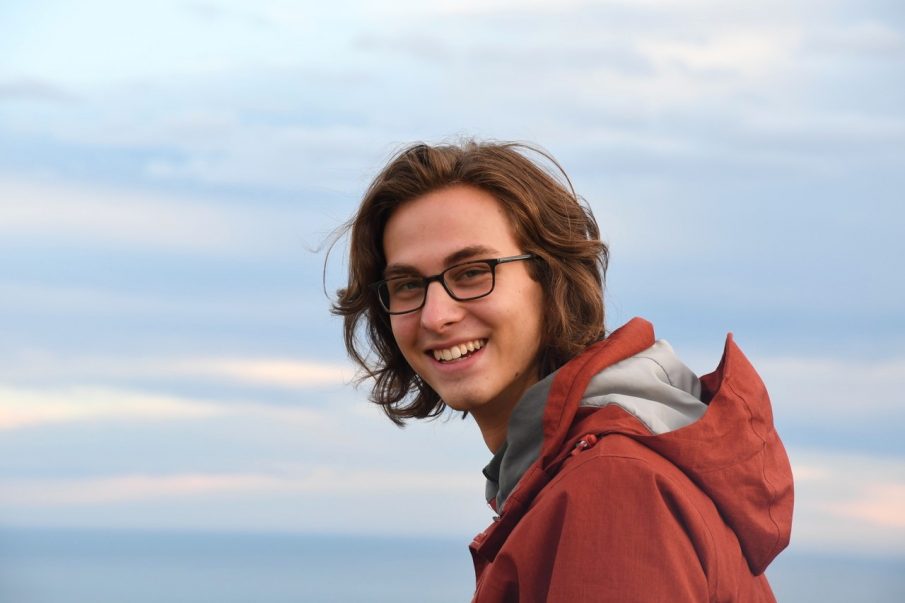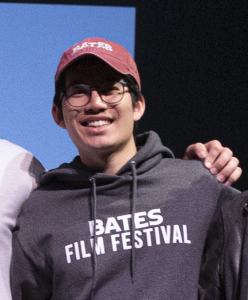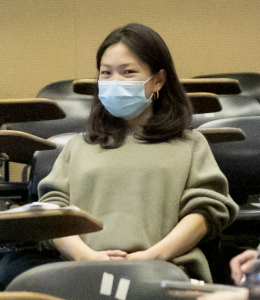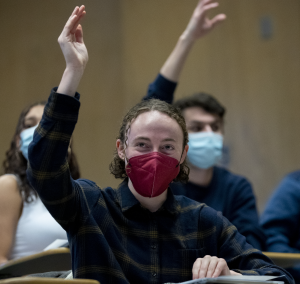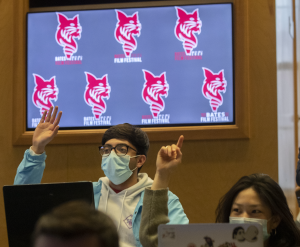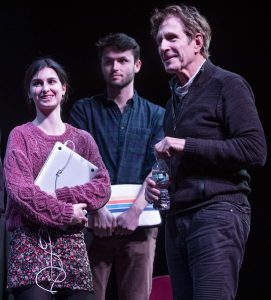By Andrew Berg (BFF 2019; Bates Class of 2020)
One of the most highly attended events from the 2019 Bates Film Festival (BFF) was the virtual reality (VR) screening of A Shared Space: Lewiston, a short film by Daniel Quintanilla and Shuab Mahat. Bates students, Lewiston community members, and faculty alike were able to experience a film that uniquely absorbed the viewer into another time, place, and storyline. In general, VR is quickly developing more of a presence on the film festival circuit. Venice, Tribeca, Cinequest, Sundance, and Cannes all have programming centered around VR; cities such as Nantucket, Vancouver, Brisbane, and London have festivals devoted entirely to this technology. Festivals play a central role in defining cinema (Wong), and the BFF board members elected to include one of the more novel forms of cinema. Our decision to program virtual reality at the Bates Film Festival was driven by the idea that it would not only create a unique viewing experience, it would also cultivate discussions around new avenues of screen studies.
“VR is quickly developing more of a presence on the film festival circuit. Venice, Tribeca, Cinequest, Sundance, and Cannes all have programming centered around VR; cities such as Nantucket, Vancouver, Brisbane, and London have festivals devoted entirely to this technology.”
One of the goals of the festival was to foster an appreciation of the artistry of screen media. But the term “screen media” has evolved to encompass mediums beyond film and television with the introduction of web series, augmented reality, mobile video applications, etc. Including only films and short films in BFF felt like an inaccurate representation of what the cinematic form has become. The idea to run a VR event was originally pitched in conjunction with a kickoff event at the beginning of the festival, where festival-goers can stop by, eat hors d’oeuvres, socialize, and experience a 360o short film in virtual reality. This was mainly due to our limited equipment. Bates has access to only one Oculus Go — a standalone, mobile virtual reality headset — and people would have to wait for one viewer to finish the short film before the next could take their turn. The experience would be very individual and very unlike any communal BFF screenings. We had to wrestle with this as well as the larger question of what short film or VR experience would be appropriate to show.
The Rhetoric, Film, and Screen Studies department at Bates often presses its students to think critically about how certain identities are represented in a film. Programming virtual reality was no different. The board discussed the ethics of allowing people to become immersed in a place, time, and/or identity outside of their own. Putting on the Oculus goggles and transporting someone to a refugee camp, for example, is not a true representation of what that experience would be. You would take off the goggles and return to the protected, academic environment of Bates, experiencing a relatively comfortable life, completely sheltered from the trauma and hardships of the camp. We have the privilege to be able to take that experience, view it, empathize, and then turn it off — the same is not true for everyone. For this reason, we were very deliberate in our programming decision.
“The Rhetoric, Film, and Screen Studies department at Bates often presses its students to think critically about how certain identities are represented in a film.“


We reached out to Maine VR filmmaker, editor, and virtual reality storyteller Daniel Quintanilla about screening a film called A Shared Space: Lewiston. Quintanilla created A Shared Space as a platform for virtual reality filmmakers who want to, in his own words, “tell stories whose themes bridge continents.” Shuab Mahat, a filmmaker and cinematographer, is one of the main characters in this film that centers around the experience of Somali immigrants in Lewiston, Maine. The experience worked well for BFF 2019 in that it asked its viewers to examine the physical and social spaces they inhabit. Shot entirely in 2017 (a politically divisive time for Maine), one segment of the film transports viewers into a Trump rally, another into the male-only section of a Mosque, a third into a basketball game in Kennedy Park. By showing VR about Lewiston in Lewiston, viewers could come out of the film with a new perspective but remain in a city with the same issues and inequalities.
The event itself was a success. We decided to have a standalone event, as one of the filmmakers — Quintanilla — offered to come to campus for the screening and bring five Oculus Go headsets. This meant that six people could be immersed in A Shared Space: Lewiston simultaneously and the additional headsets eliminated the need for hors d’oeuvres to fill time between viewings. People sat in rolling chairs with headphones on and, once they placed the goggles over their eyes, were transported from Chase Hall to Lewiston.
With that being said, a part of what makes traditional screenings so impactful is that they are social experiences. The communal setting of a movie theater leads to compounded and more intense emotions, which often translates to a more enjoyable movie-going experience overall (Srinivas). Despite six people wearing the Oculus Go, the experience is still extremely individual. And yet, the social aspect often followed the viewing. After watching A Shared Space: Lewiston, viewers discussed the film with each other and with the festival staff. I was especially glad to have one of the filmmakers be a part of the screening, as this allowed people to talk to him and ask questions about the process of VR filmmaking. In all, this was one of BFF’s most highly attended screenings, with the Lewiston Sun Journal even reporting on the event.
Coming back to the original controversy with VR, we still have to answer the question of what constitutes appropriate roaming and viewing experiences. Bill Nichols has investigated how viewers encounter cinemas and cultures that are not our own. When considering A Shared Space: Lewiston, one might ask what it means to be immersed in the male-only section of a mosque? A form of pleasure certainly resides in experiencing this sort of strangeness of viewing another culture — but is it more important to recover the difference as similarity? (Nichols) As the bounds get pushed further and further for VR cinema, these questions will become all the more important. Hopefully the Bates Film Festival continues the virtual reality programming and advances the discussion into the next few years.
Sources
Nichols, Bill. “Discovering Form, Inferring Meaning: New Cinemas and the Film Festival Circuit.” Film Quarterly, vol. 47, no. 3, 1994, pp. 16–30. JSTOR, www.jstor.org/stable/1212956.
Srinivas, Lakshmi. “The Active Audience: Spectatorship, Social Relations and the Experience of Cinema in India.” Media, Culture & Society 24.2 (2002): 155-173.
Wong, Cindy Hing-Yuk. Film Festivals: Culture, People, and Power on the Global Screen. Rutgers University Press, 2011.

